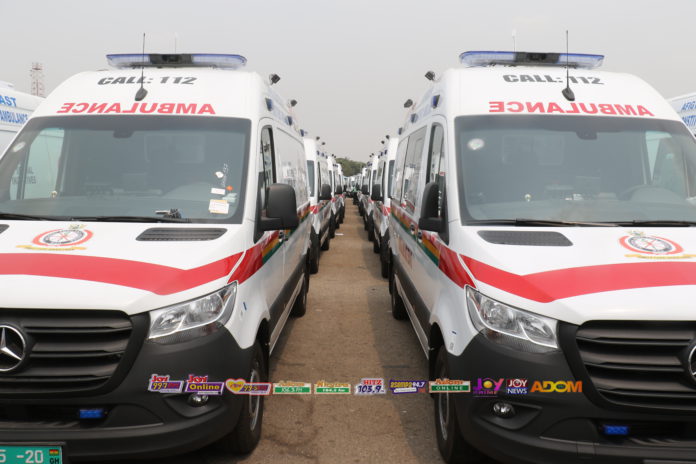Barely a month of distributing the much anticipated 307 ambulances by the government, more than 23 lives have been saved by the National Ambulance Service (NAS) in the Central Region.
Mr. Francis Ohemeng, the Regional Administrative Manager of NAS who disclosed this to the Ghana News Agency (GNA) indicated that the distressed patients could have died among other dire health consequences but for the timely intervention of the ambulances.
Before the arrival of the new ambulances, the Region had just two ambulances serving the over 2.5 million people on a 9,826 km2 (3,794 sq mi) land area which made the work cumbersome and largely ineffective.
The Region, hitherto depended on private ambulances or fell on the Greater Accra for help at a higher cost considering the largely low income population of the Region.
Mr. Ohemeng heaped praises on the government for the bold initiative of procuring the new state-of-the-art ambulances, and added that personnel had been trained and equipped to be more efficient in their operations.
“Now, we have 25 operational ambulances to serve our people. We also have enough human resources to be dispatched for all services and this will go a long way to make our services appreciated.”
So far, all cases attended to are largely internal, transferring patients from one hospital to another for emergency attention.
He was optimistic that the years of inaccessible and lack of prompt ambulance services were over and urged all to keep their emergency numbers but must endeavour to avoid prank calls.
“When you need the services of the ambulance kindly call 112, your call would be received at the national dispatch centre and redirected to the Regional Control room and immediately your issue will be handled,” he added.
To better serve the people, Mr Ohemeng announced that the NAS will soon begin a massive public education on its mandate and share its emergency numbers to reach out to all regardless of one’s location.
Additionally, he assured that his outfit will go all out to ensure that the vehicles were religiously maintained with unrivaled customer service to ensure effectiveness and satisfaction.
However, in separate interviews with some beneficiaries of the new ambulances, Mr Alfred Renos described the distribution of the ambulances as apt but urged the NAS to do away with the unnecessary delays that made their services unattractive.
Another, Mrs Mary Affum, a trader was grateful to the government for furnishing districts with what she considered the most important service and urged them to see to the needs of the inhabitants.

